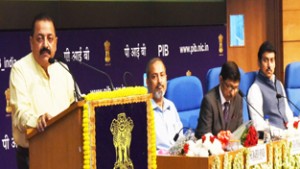Excelsior Correspondent

NEW DELHI, Oct 28: Union Minister Dr Jitendra Singh said here today that history will record “Cooperative Federalism” as “Modi doctrine” and it will be remembered as one of the most path-breaking initiatives in the history of independent India.
Delivering the prestigious Sardar Patel Memorial Annual Lecture on the subject “Cooperative Federalism: Reconciling Regional Aspirations and National Cohesion”, Dr Jitendra Singh, MoS PMO with Independent Charge of Northeast, said,he was humbled by the fact that he had been invited to deliver a commemmorative annual lecture which was initiated in 1955 with the first speaker being C. Rajagopalachari, an intellectual stalwart, who was in the subsequent years followed by some of the most brilliant luminaries of their times. It was an honour to deliver a lecture dedicated to the memory of the first Home Minister of India, Sardar Patel, who is remembered as the creator of the Union of India by bringing together over 565 princely States, he said.
Dwelling on the subject of cooperative federalism, Dr Jitendra Singh said, it goes to the credit of Prime Minister Narendra Modi to have realized the need to revisit the entire set up of three tier system incorporating Central, State and local Governments as well as the gambit of Centre-State relationship in order to make it capable of offering optimum benefit from the current phase of rapid economic and development growth that India was going through. He said, as the nations and societies evolve to a higher level of functioning, it is expected that they would develop a natural instinct for mutual coexistence and mutual cooperation but till the time that level of functioning is achieved, we need to have structuring and restructuring from time to time with a set of rules, guidelines and legislations in place.
Soon after the present Government took over, Dr Jitendra Singh said, it was realized that the Planning Commission had, somewhere down the line, digressed its original role of primarily being a think-tank and there were also complaints that it was intervening in the routing of bulk of grants and grants – in – aid to the States. The three most important decisions taken by the Government in the last two years include a) setting up of NITI Aayog instead of Planning Commission, b) devolution of taxes to States and c) introduction of Goods & Services Tax (GST), he said.
As far as NITI Aayog is concerned, Dr Jitendra Singh said, quite contrary to the erstwhile Planning Commission, NITI Aayog encourages cooperative federalism through structure support initiatives and accommodates diverse viewpoints with a deeper engagement of different States. Its functioning is also more participatory and democratic since the NITI Governing Council includes Chief Ministers, Lieutenant Governors and Administrators, and there are further sub-groups with Chief Ministers for special focus on certain flagship programmes, he added.
As for GST, Dr Jitendra Singh said, it has the potential to provide unified common national market by integrating various taxes and levies from States and Centre while the dictum of ‘One Nation, One Tax’ has wider connotations. In addition, he said, the GST Council with its mandatory requirement to take decisions with 3/4th majority ensures that all the view points are accommodated.
No Government in the past, Dr Jitendra Singh noted, has shown the courage to raise the share of the States in divisible pool of taxes from 32% to 42% as per the recommendations of 14th Finance Commission and our figures indicate that as many as 26 States have recorded rise in their total quantum gain.
Contrary to the apprehension expressed in certain quarters that with its 2/3rd mandate, the Modi Government will become authoritarian and centralised, Dr Jitendra Singh said, the truth is that the present Government has brought in provisions which have reinforced confidence of all stakeholders of being equal partners in the development of nation as well as the individual States. This is truly living up to the spirit of PM Modi’s clarion call “Sab Ka Sath, Sab Ka Vikas”,he added.
MoS I&B Col. Rajyavardhan Singh Rathore, DG All India Radio Fayyaz Sheheryar, Chairman Prasar Bharati Surya Prakash, heads of various News Bureaus and Agencies, and eminent members of journalists’ fraternity were present on the occasion.

